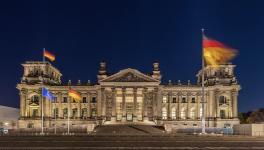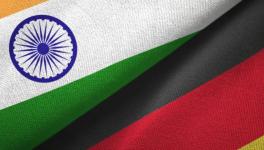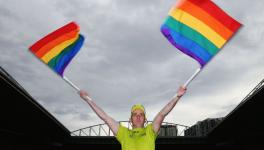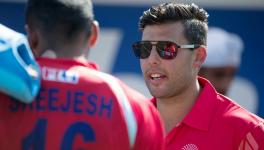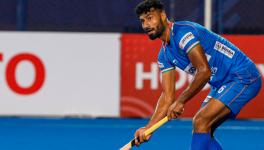Hockey's World Cup Has No Problem With Rainbow Armbands
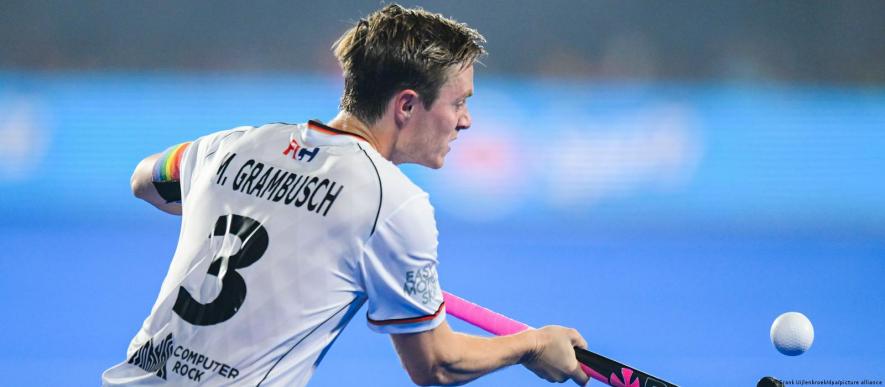
There was no sign of protest at the Kalinga Hockey Stadium in Bhubaneswar. On the contrary, the fact that Mats Grambusch wore a rainbow-striped captain's armband during the German national field hockey team's first match at the field hockey World Cup against Japan caused no displeasure at all. And the Germans won 3-0.
The colorful symbol for the worldwide LGBTQ+ community was accepted without complaint from either the spectators on site or by the World Hockey Federation (IHF), who were forewarned by the German Hockey Federation (DHB) of their intentions.
"I do believe that you can transport values into society through sport," Grambusch told DW in the run-up to the game. "We would have done the same if the World Cup were held in the Netherlands, Germany or Qatar. We stand for these values and want to embody that at the World Cup."
Symbol of hope and solidarity
There is no question of the problems that occurred at the football World Cup in Qatar, which ended last December. World football's governing body FIFA strictly forbade the wearing of the "One Love" armband due to the hosts feeling unfairly treated.
When it comes to the field hockey players and their World Cup in India, it’s the complete opposite with the DHB’s request met with an overwhelmingly positive response from the local community.
"There’s certainly power in visibility, especially when a leading sportsperson openly takes up the cause of LGBTQ+ inclusion," LGBTQ+ activist Anish Gawande tells DW. "However, such a 'message of tolerance' should not be seen as a radical act meant to give voice to some notion of a 'voiceless' LGBTQ+ community in India. I would be more keen to see this as a symbol for a wider acceptance of queer and trans people in sports as a whole."
![]()

Acceptance for the LGBTQ+ community has grown in recent years in IndiaImage: Ayush Chopra/SOPA Images via ZUMA Press Wire/picture alliance
"Everyone deserves the right to express themselves unabashedly," activist Harish Iyer explained to DW. "The rainbow is a symbol of hope and solidarity with the LGBTQ+ community. We should celebrate it. The question should not be 'why are you wearing it', but rather 'why the hell not'."
Landmark rulings by India's Supreme Court
Yet even in the South Asian nation, social recognition of the LGBTQ+ community has been a long, ongoing process. It wasn't that long ago that homosexuality was no longer a criminal offense in India. In a decision hailed as historic, the country's Supreme Court in 2018 overturned a more than 100-year-old ban that criminalized homosexual acts between adults.
Yet members of the LGBTQ+ community often continue to live in the shadows, rejected by their families or society. Activists like Anish Gawande and Harish Iyer are helping them become more visible. "Despite significant progress over the course of the last two decades, the LGBTQ+ community in India continues to face significant challenges," Gawande says.
Then, last summer, the same court ruled that same sex couples are entitled to the same social benefits as traditional families. Another step toward "normalcy." There have since been further efforts by the community, with the help of petitions, to bring further measures around equality into law.
Criticism from politics
However, there are political parties in India that have a hard time with this. The Bharatiya Janata Party (BJP) government in the northern state of Uttar Pradesh, for example, has called same-sex marriages incompatible with Indian culture and religion. "The community is facing oppression all over the world," laments activist Iyer.
![]()

Grambusch believes people's sexuality shouldn't come into question in modern societyImage: Sukhomoy_ Sen/Eyepix Group/IMAGO
Indian society, which is often still quite conservative, has already become more accepting. In a 2019 survey by the US-based Pew Research Center, it is clear that a societal transformation has begun. The survey found that between 2013 and 2019, society's acceptance of homosexuality increased by 22%.
Grambusch: "Must become complete normality"
"The supreme court of india has decriminalized consensual sexual relations between all adults and recognizes people who identify as transgender," Iyer says. "We need to do more, but we have taken the first major step."
Hockey team captain Mats Grambusch is also aware that the issue of homophobia is not exclusive to India. "This issue needs to be more mainstreamed in different societies. It has to become complete normality that people have different sexualities and that is not questioned in any way," Grambusch said.
This article was translated from German
Get the latest reports & analysis with people's perspective on Protests, movements & deep analytical videos, discussions of the current affairs in your Telegram app. Subscribe to NewsClick's Telegram channel & get Real-Time updates on stories, as they get published on our website.









